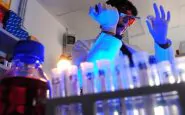Rome, September 29 (Adnkronos Salute) – A protein to identify people with colon cancer who will respond to chemotherapy, thus avoiding unnecessary side effects for patients who cannot benefit. The discovery was made by a team coordinated by Livio Trusolino and Andrea Bertotti, heads of the Translational Oncology Laboratory at the IRCCS Candiolo and professors of Histology at the Department of Oncology at the University of Turin.
The work was published in the journal Cancer Discovery: scientists have identified a protein—RAD51—that, when expressed at high levels, predicts resistance to standard chemotherapy. This discovery has a dual value: it allows for the early identification of patients unlikely to respond to treatment and opens the door to alternative therapeutic strategies.
Chemotherapy is the standard treatment for most patients with inoperable metastatic colon cancer, yet only about half respond. To understand the reasons for this resistance, researchers at the Candiolo Institute - IRCCS used tumor organoids (mini-organs), miniature three-dimensional replicas obtained from patient samples.
"We focused on Folfiri, a chemotherapy treatment that almost all patients receive during their clinical journey," explains Marco Avolio, a postdoctoral assistant who performed the organoid assays. "The first observation was that sensitive organoids suffered significant DNA damage after exposure to Folfiri, while in resistant ones, the DNA appeared essentially intact: a clue that suggested that resistance was linked to a high capacity for repairing DNA structural damage caused by chemotherapy."
After a systematic analysis of proteins involved in repair mechanisms, the breakthrough came with RAD51. "It was clearly more expressed in resistant organoids," explains Simonetta Leto, senior researcher. "By artificially inserting it into sensitive models, they became resistant. We had found a functional marker of resistance." The next step was to verify its clinical value. With the multicenter IRIS study, which involved approximately 80 Italian and Spanish patients, researchers demonstrated that elevated RAD51 levels are systematically associated with failure to respond to Folfiri not only in experimental models but also in patients. "The marker is easily measurable in routine diagnostic samples," emphasizes Bertotti, "and can help early select patients eligible for therapies other than standard chemotherapy."
But it doesn't end there. If RAD51 makes tumors resistant, its inhibition could resensitize them to Folfiri. "We've tested several approaches," explains Trusolino. "Directly blocking RAD51 isn't clinically feasible, but an alternative has proven very promising: inhibiting ATM, a protein that controls RAD51 function upstream. In our models, combining an ATM inhibitor with Folfiri restored significant therapeutic efficacy. And the good news is that ATM drugs are already in clinical trials. Now that the publication is out and the scientific community is aware, we're starting to warm up with our clinical oncology collaborators to contact the pharmaceutical companies that produce ATM inhibitors and involve them in designing a dedicated study."

